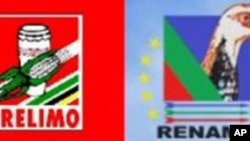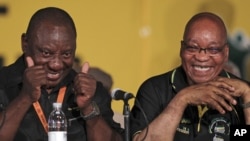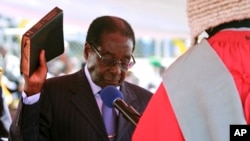WASHINGTON DC —
The July 31st elections saw Zimbabwe’s revolutionary party, Zanu-PF, return to power. President Robert Mugabe won another 5-year term in office and the party racked up a whopping majority that will allow them to amend the new constitution.
Supporters of the Movement for Democratic Change (MDC) and other opposition parties now find themselves stripped of the power they had in the unity government and wondering how to improve their results in future elections.
But the odds are stacked against opposition parties in Zimbabwe. Indeed, across Africa, people who disagree with ruling parties often find themselves facing violence and a host of legal obstacles.
For much of the 20th century, African independence movements fought colonialism throughout the continent. The movements rejected colonial structures that made whites the elite. Now that the revolutionary parties are in power, many use the same colonial-era structures to maintain their power, and keep opposition parties weak.
Former liberation parties like the Kenya African National Union, Frelimo of Mozambique, the Movement for the Liberation of Angola (MPLA), the Sudan People’s Liberation Movement (SPLM) in South Sudan, and Zimbabwe’s Zanu-PF are among ruling parties that dismantled colonial regimes and are now largely intolerant of any form of political opposition.
Officially, the parties may embrace multi-party systems and democracy, but their treatment of political opponents is controversial.
Answers to why this is can be found in history. After World War 2, much of the world found itself aligned with western democracy and capitalism, or with Soviet and Chinese style communism. The Western democracies, however, denied freedoms and equality to their African colonies.
Champions of African liberation were naturally supported by communist powers and ideologies, which preached against the evils of colonialism. One-party dictatorship was another tenet of the Soviet and Chinese models.
Tanzania’s Chama Cha Mapinduzi is an example of an African socialist liberation party. It has been in power for more than 50 years and until 1992 was the country’s only legal party.
As Chama Cha Mapinduzi spokesperson Nape Nnauye explains, the country’s founding leaders strongly believed in socialist principles which encouraged one party rule.
“This is one of the oldest parties in Tanzania and perhaps in Africa. We had a multiparty system before and just a few years after independence but then we went for a single party system for years. This is what the founding fathers preferred at that time,” he says.
But, Nnauye says, this changed over the years, particularly after the collapse of the Soviet Union, and gradually multi-party politics and some elements of capitalism emerged.
He says African political opposition, including in Tanzania, has failed to live up to expectations and that is why opposition parties do not succeed in some nations.
“Unfortunately, they have not grown enough to make a difference. They have a challenge in Tanzania or even in Africa. Most of the opposition political parties have failed to provide an alternative solution to the challenges or problems that are facing their countries. Most of the opposition parties are concentrating themselves in criticizing the party in power, criticizing the policies which are implemented by the party in power,” he says.
He says where the opposition is weak, ruling parties are more tempted to abuse power. Therefore, he says, a robust opposition is key to promoting democracy.
His views are echoed by Mathew Siphosa, the African National Congress’ deputy presidential candidate in South Africa’s last primary elections.
Siphosa says the ANC is one of the few liberation parties in Africa which encourages opposition parties. He says the ANC fought for one-person-one-vote, so it would be against the party’s core ideology to suppress opposition parties.
“If you read our constitution very carefully and attentively, it actually uses the word multiparty and participatory democracy which means we allow different parties to participate in the processes of electing new governments and we allow the masses themselves to exercise their vote,” he says.
But while South Africa’s first black president, Nelson Mandela, willingly stepped down after only one term, in Zimbabwe, President Robert Mugabe has ruled for more than 33 years.
Mr. Mugabe, who is starting his seventh term, is widely viewed by critics as a man who is fundamentally opposed to any form of political opposition.
This is not too surprising, as a year before independence from British rule, Mugabe declared that Zimbabwe would be built on socialist and Marxist principles, which generally require one-party rule to enforce.
“We are dedicated to socialism … We are fighting for democracy and we would like to see a democratic state established in Zimbabwe and this means a state based on the wishes of the majority of the people.”
While political opposition is not illegal in Zimbabwe, the 89-year old Mugabe is clearly not looking to hand over power. In fact, in the late 1980s and early 1990s, his Zanu-PF party attempted to entrench itself as the only legal political authority in the country.
Zanu-PF parliamentary chief whip and veteran politician, Joram Gumbo, does not reject opposition parties outright, but says they should work closely with ruling parties for the benefit of the people.
“To be in opposition is a good thing but even if you are in opposition you must know that first and foremost you are united by the flag that tells you that you are a Zimbabwean,” he says.
He says his contention with the MDC, which was formed in 1999 by a coalition of civil society groups under the leadership of former Prime Minister Morgan Tsvangirai, aligned itself with Western interests, which is why it angered people within Zanu-PF.
“The MDC was formed because they supported the view of the whites. That is all we have been very much against as a political party and we said now you are a puppet of the West but otherwise there have been other political parties here which have died a natural death because they did not have support. They were never regarded as puppets of the West.”
He says opposition parties should be more willing to co-operate with the government in power and regard themselves as a government in waiting.
While political opposition struggled in Zimbabwe and other African countries, some ruling parties in east and southern Africa see the importance of opposition parties as they perform a watchdog role.
“I can see a bright future of the opposition. For example, in Tanzania in 2015 there won’t win the election but after losing the election they will adjust themselves from 20 opposition parties to may be three or four … Also those old guards from the opposition will decide to retire and will allow new blood to come and those young politicians I believe they see the mistakes these old guards are doing and it might help them to reshape the opposition,” he says.
The term “loyal opposition” was coined by a British Member of Parliament almost 200 years ago to indicate that non-governing parties can oppose the sitting cabinet while remaining loyal to the nation.
While appreciation for the concept of a loyal opposition seems lost in Zimbabwe, it does appear to be gaining ground in other places on the continent.
In part 2 of this three-part series - Opposition politics in Zimbabwe and beyond - we will hear directly from opposition parties like Zimbabwe’s Movement for Democratic Change and Zapu, Malawi’s Democratic Progressive Party, and others. How do they see their role and the future of political opposition?
Supporters of the Movement for Democratic Change (MDC) and other opposition parties now find themselves stripped of the power they had in the unity government and wondering how to improve their results in future elections.
But the odds are stacked against opposition parties in Zimbabwe. Indeed, across Africa, people who disagree with ruling parties often find themselves facing violence and a host of legal obstacles.
For much of the 20th century, African independence movements fought colonialism throughout the continent. The movements rejected colonial structures that made whites the elite. Now that the revolutionary parties are in power, many use the same colonial-era structures to maintain their power, and keep opposition parties weak.
Former liberation parties like the Kenya African National Union, Frelimo of Mozambique, the Movement for the Liberation of Angola (MPLA), the Sudan People’s Liberation Movement (SPLM) in South Sudan, and Zimbabwe’s Zanu-PF are among ruling parties that dismantled colonial regimes and are now largely intolerant of any form of political opposition.
Officially, the parties may embrace multi-party systems and democracy, but their treatment of political opponents is controversial.
Answers to why this is can be found in history. After World War 2, much of the world found itself aligned with western democracy and capitalism, or with Soviet and Chinese style communism. The Western democracies, however, denied freedoms and equality to their African colonies.
Champions of African liberation were naturally supported by communist powers and ideologies, which preached against the evils of colonialism. One-party dictatorship was another tenet of the Soviet and Chinese models.
Tanzania’s Chama Cha Mapinduzi is an example of an African socialist liberation party. It has been in power for more than 50 years and until 1992 was the country’s only legal party.
As Chama Cha Mapinduzi spokesperson Nape Nnauye explains, the country’s founding leaders strongly believed in socialist principles which encouraged one party rule.
“This is one of the oldest parties in Tanzania and perhaps in Africa. We had a multiparty system before and just a few years after independence but then we went for a single party system for years. This is what the founding fathers preferred at that time,” he says.
But, Nnauye says, this changed over the years, particularly after the collapse of the Soviet Union, and gradually multi-party politics and some elements of capitalism emerged.
He says African political opposition, including in Tanzania, has failed to live up to expectations and that is why opposition parties do not succeed in some nations.
“Unfortunately, they have not grown enough to make a difference. They have a challenge in Tanzania or even in Africa. Most of the opposition political parties have failed to provide an alternative solution to the challenges or problems that are facing their countries. Most of the opposition parties are concentrating themselves in criticizing the party in power, criticizing the policies which are implemented by the party in power,” he says.
He says where the opposition is weak, ruling parties are more tempted to abuse power. Therefore, he says, a robust opposition is key to promoting democracy.
His views are echoed by Mathew Siphosa, the African National Congress’ deputy presidential candidate in South Africa’s last primary elections.
Siphosa says the ANC is one of the few liberation parties in Africa which encourages opposition parties. He says the ANC fought for one-person-one-vote, so it would be against the party’s core ideology to suppress opposition parties.
“If you read our constitution very carefully and attentively, it actually uses the word multiparty and participatory democracy which means we allow different parties to participate in the processes of electing new governments and we allow the masses themselves to exercise their vote,” he says.
But while South Africa’s first black president, Nelson Mandela, willingly stepped down after only one term, in Zimbabwe, President Robert Mugabe has ruled for more than 33 years.
Mr. Mugabe, who is starting his seventh term, is widely viewed by critics as a man who is fundamentally opposed to any form of political opposition.
This is not too surprising, as a year before independence from British rule, Mugabe declared that Zimbabwe would be built on socialist and Marxist principles, which generally require one-party rule to enforce.
“We are dedicated to socialism … We are fighting for democracy and we would like to see a democratic state established in Zimbabwe and this means a state based on the wishes of the majority of the people.”
While political opposition is not illegal in Zimbabwe, the 89-year old Mugabe is clearly not looking to hand over power. In fact, in the late 1980s and early 1990s, his Zanu-PF party attempted to entrench itself as the only legal political authority in the country.
Zanu-PF parliamentary chief whip and veteran politician, Joram Gumbo, does not reject opposition parties outright, but says they should work closely with ruling parties for the benefit of the people.
“To be in opposition is a good thing but even if you are in opposition you must know that first and foremost you are united by the flag that tells you that you are a Zimbabwean,” he says.
He says his contention with the MDC, which was formed in 1999 by a coalition of civil society groups under the leadership of former Prime Minister Morgan Tsvangirai, aligned itself with Western interests, which is why it angered people within Zanu-PF.
“The MDC was formed because they supported the view of the whites. That is all we have been very much against as a political party and we said now you are a puppet of the West but otherwise there have been other political parties here which have died a natural death because they did not have support. They were never regarded as puppets of the West.”
He says opposition parties should be more willing to co-operate with the government in power and regard themselves as a government in waiting.
While political opposition struggled in Zimbabwe and other African countries, some ruling parties in east and southern Africa see the importance of opposition parties as they perform a watchdog role.
“I can see a bright future of the opposition. For example, in Tanzania in 2015 there won’t win the election but after losing the election they will adjust themselves from 20 opposition parties to may be three or four … Also those old guards from the opposition will decide to retire and will allow new blood to come and those young politicians I believe they see the mistakes these old guards are doing and it might help them to reshape the opposition,” he says.
The term “loyal opposition” was coined by a British Member of Parliament almost 200 years ago to indicate that non-governing parties can oppose the sitting cabinet while remaining loyal to the nation.
While appreciation for the concept of a loyal opposition seems lost in Zimbabwe, it does appear to be gaining ground in other places on the continent.
In part 2 of this three-part series - Opposition politics in Zimbabwe and beyond - we will hear directly from opposition parties like Zimbabwe’s Movement for Democratic Change and Zapu, Malawi’s Democratic Progressive Party, and others. How do they see their role and the future of political opposition?









